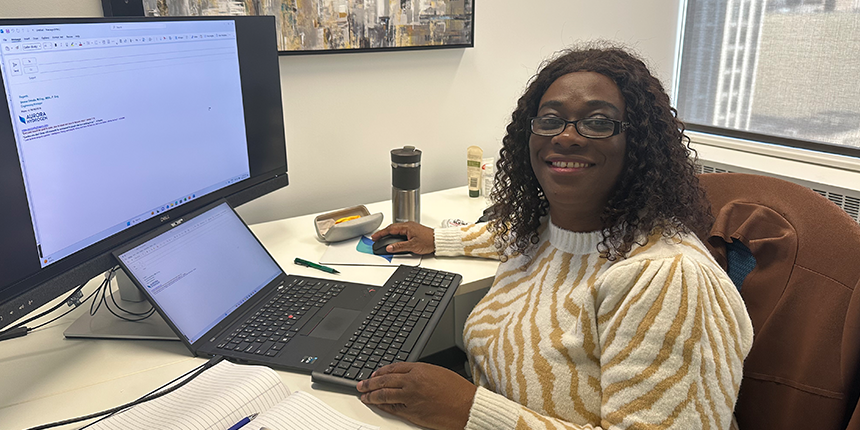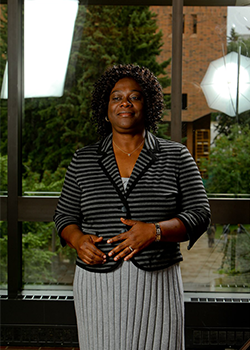
Ijeoma Omodu is a mechanical engineer and an environmentalist who works in the oil and gas industry, focusing on reducing emissions and environmental impact while advocating for sustainable energy and energy security.

Many people see the oil and gas industry as fundamentally incompatible with environmentalism. To Ijeoma Omodu, that opinion falls short of realizing the intricacies of the global energy industry. Growing up in eastern Nigeria, where most of Nigeria’s oil and gas is produced, Omodu has always believed that “energy drives the world.”
Omodu often confronts surprise due to her seemingly opposing positions. “People say, how is that possible?” Omodu herself has no conflicting thoughts on her work. “I am an environmentalist. I work in energy. I work in oil and gas... You have to be at the table for the things that matter to you. I cannot think of any other place I would have spent my life than what I'm doing.”
“Energy drives the world”
Omodu’s journey began when she was recruited by Royal Dutch Shell as a young professional to enroll in a specialized energy program that taught her the oil and gas production system, from exploration all the way to selling the product. She was fascinated with the industry and decided to focus her efforts in energy systems and started off as a production engineer in an offshore production platform. She has worked on a variety of roles including pipelines, maintenance, and commercial business and project portfolios, all of which have strengthened her understanding of the system and increased her determination to work towards environmental solutions.
For example, one of her previous roles involved working as a production engineer at several offshore platforms. This meant she was sometimes in the position of offshore on-site commander, in charge of hundreds of personnel and responsible for the oil production, the safety systems, and the environmental impact. Omodu credits this position with pushing her to get a degree in environmental engineering on top of her mechanical engineering degree, so that she could improve wastewater management from the oil production in an environmentally responsible way.
“The aspect of engineering that gladdens my heart is making sure that no matter what it is I am doing, I'm doing it in a way that is sustainable... That drives everything I do. And that's what makes me go home at the end of the day and feel happy that I have done something that's impacting lives,” Omodu says.
The emissions caused by fossil fuel extraction and use are impacting the environment, and therefore human societies, in ways that are increasingly destructive. “Every aspect of our life is powered by energy, so we cannot just shut off fossil fuel,” Omodu says, “We use a lot of energy. So the goal is to make it sustainable. The goal is to limit emissions. The goal is to decarbonize fossil fuel.”
Finding the sweet spot
Omodu knows that an energy transition to sources that limit emissions and create more sustainable and less damaging processes are necessary to contribute to energy security and sustainability in the future. She has made it her priority to focus solutions that lower and decarbonize emissions, and on a transition that will not destabilize people’s access to energy.
“We know that our activities are impacting the environment to the point that we might extinguish ourselves,” Omodu says. However, she and many others in the energy industry have the expertise to decarbonize fossil fuel and make change possible, especially if people can be mobilized to work together.
“Alberta is a leader in energy in the world. And when I say a leader, I'm talking about expertise and ingenuity. I'm talking about ability to make changes,” Omodu says.
While there is an ongoing global push for a sustainable energy transition, Omodu believes that Canada should be doing more by enacting policies to strengthen environmental protection while enabling actions that make energy transition the only viable option, thus contributing to environmental sustainability.
“I have immersed myself in energy transition and decarbonization of fossil fuel... We can have both. We just need to make sure that we have that balance, the sweet spot,” says Omodu.
Omodu is currently an engineering manager at Aurora Hydrogen, which is focused on microwave powered production of emission-free hydrogen.
Currently, hydrogen is produced as a product of the processing of natural gas. With demand for hydrogen increasing, there is an increasing need to find low-cost, low-carbon technologies to produce cleaner fuel.
As part of the team, Omodu is leading development, design, and construction of our novel hydrogen plant, and ensuring the work is up to legal codes and standards. “I do planning, I do deployments, I set up supply chain, I'm looking at site preps...” Omodu explains. As with her previous positions, she takes her responsibility to minimize impacts on health and safety seriously: “What is the best way to support the plant operations to make sure that it is safe? How do I limit noise? How do I make sure that my neighbors are not impacted negatively in what we are doing? How do I also make sure that what we are doing is cost effective and efficient?”
Engineering without borders

Omodu has greatly appreciated the ability to practice her engineering in a variety of places. “The beauty of the energy industry is that it gives you the ability to practice engineering without boundaries,” Omodu says. For industries like oil and gas, which are international with extremely similar engineering codes and standards worldwide, the energy industry also provides easy mobility for engineers.
“I believe that this is the time for engineering... because of the way innovation is going, the next decade is, I will say, a world made for engineers,” Omodu states. The problem solving, adaptation, and practical skills of engineers are what Omodu believes we need to face the challenge of the upcoming energy transition.
In her opinion, change is coming, whether the industry likes it or not. The only way to make sure the transition is sustainable, equitable, and maintains energy security for the country is if the transition begins before circumstances make it unavoidable.
“From my own personal experience,” Omodu says, “People say no to things because they are unseen. If you see a train coming towards you, you're not going to stand there, if you can move, you're going to move.”
She blames this lack of insight on the current state of complacency by industry and government. "People are not getting the information that they need. People do not understand in lay person terms the urgency of now.”
Omodu wants future engineers to consider the challenge of how to provide people with energy security while maintaining resources for the future. For Omodu, that is what engineering is about: “Making life safe and better for people.”
“I tell anyone who wants to be an engineer that first of all, he or she is making the right decision because being an engineer gives you the opportunity to make impact no matter where you are,” Omodu says. “Be open to learning. Believe in yourself. Develop your problem-solving skills and don't forget your instincts. Because when you believe in yourself, there will be no problem you can't solve.”
Engineers build more than just bridges. Building Tomorrows is a series that highlights the important contributions of engineers and the many ways they help to make our world a better place.


